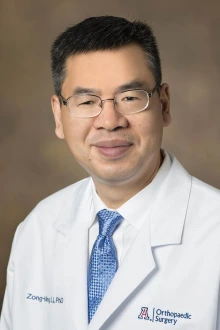Dr. Zong-Ming Li Earns National Award for Work in Hand Biomechanics
Zong-Ming Li, PhD, University of Arizona College of Medicine – Tucson professor of orthopaedic surgery and director of the Hand Research Laboratory, has been selected by the American Society of Mechanical Engineers to receive the 2022 Savio L-Y. Woo Translational Biomechanics Medal, which is awarded to an individual who has taken bioengineering science from fundamental lab discoveries toward clinical applications for patients.
“I’m humbled to receive this award and honored that the committee selected the lab to recognize our contribution to carpal tunnel work,” said Dr. Li, who is also a professor of biomedical engineering at the UArizona College of Engineering. “The Hand Research Laboratory’s mission is to understand how the normal hand works and how to fix the hand when its function is disturbed. As an engineer, it is so interesting to study the human body — in our case, the complexity of the hand and wrist.”

Zong-Ming Li, PhD
Dr. Li has looked at the hand and wrist through an engineer’s lens to figure out how they work. As he unraveled more and more of their mysteries, he began developing engineering solutions to problems such as carpal tunnel syndrome, a condition that affects approximately 3% of the general population and is characterized by tingling, numbness or weakness in the affected hand.
The carpal tunnel is a space in the wrist through which the median nerve travels from the arm into the hand, passing under the transverse carpal ligament. When the ligament pushes against it, the nerve can become irritated, which may result in carpal tunnel syndrome.
“In the U.S., a half-million people are getting surgery each year, but it is not a perfect solution,” Dr. Li said. “We asked, ‘Can we relieve the median nerve without surgery?’ That simple question has kept us busy for years.”
Dr. Li’s team at the Hand Research Laboratory and colleagues at Cleveland Clinic have developed a mechanism that intermittently compresses the ligament and causes it to bend in a way that reduces pressure on the adjacent nerve. In early trials, the wrist manipulation improved symptoms in participants.
Dr. Li says discovering how to manipulate the space in the carpal tunnel to make more room for the nerve is one of his proudest accomplishments because it has potential to help countless patients.
“To find this simple principle that nobody else in the field is thinking of, that’s exciting,” he said. “We want to find solutions to clinical problems, not just to understand them. But bringing this translational work to fruition takes years of work.”
The device has completed early clinical trials, and Dr. Li and his collaborators are seeking grants to advance to the next phase of investigation, hoping to enroll patients at multiple sites across the country to test its effectiveness and determine the optimal strategy for its use.
For Dr. Li, receiving an award named after Savio L-Y. Woo is especially meaningful, as earlier in his career Dr. Li spent time in Dr. Woo’s Musculoskeletal Research Center at the University of Pittsburgh.
“Dr. Woo is a giant in orthopedic sports medicine and bioengineering. I learned from him to focus on a clinical problem, run a lab, serve the profession and mentor future generations,” Dr. Li recalled. “Even after I moved to another institution, our relationship continued. I could call him often, and he kept mentoring. He’s truly inspiring.”
Dr. Li earned his doctorate in biomechanics at Penn State University under the mentorship of Vladimir Zatsiorsky, a prominent figure in the field who had recently shifted his focus to the hand. It didn’t take long for Dr. Li to share this fascination.
Dr. Li also serves as the vice chair for research in the Department of Orthopaedic Surgery and the associate director of the UArizona Arthritis Center. He holds the William and Sylvia Rubin Endowed Chair in Orthopaedic Research, and is a member of the BIO5 Institute.

